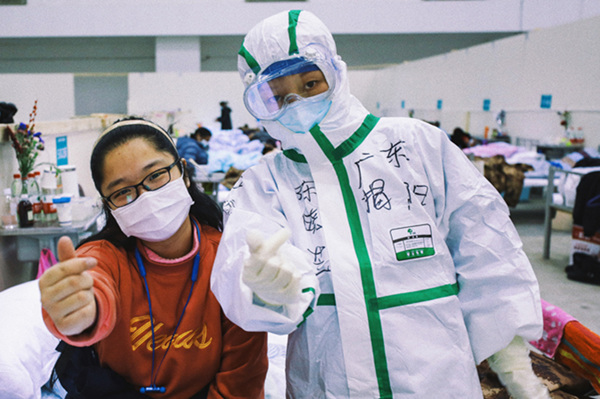
A still from "Days and Nights in Wuhan" shows a student and a medical worker posing for a photo in Wuhan during the COVID-19 pandemic in 2020. [Photo courtesy of China Movie Channel]
As one of the audience touched by the power of "Days and Nights in Wuhan," renowned Chinese director Xu Zheng suggested the documentary should be released to the world so that the true picture of the Chinese people fighting COVID-19 can be understood.
"Any normal people watching this film would shed tears," Xu said, with tears still in his eyes, "We should let Americans see this. We should let the world see this. And then they will understand how much Chinese people suffered from the pandemic, and how strong, kind and merciful they regard life, and how they survive."
Currently, there's no plan to release the film overseas.
Xu also praised the medical workers, whose images are recorded in the film, for the "light of love" they brought to their patients.
The documentary builds a storyline around the lives of ordinary people, including patients, medical personnel, volunteers and residents, as the virus spread last year through the central Chinese city of Wuhan that was the epicenter of the original pandemic. The film made its national debut on Friday.
Xu was among a great many in the audience who were deeply touched by the film, especially Wuhan's own residents. "I cried, but I'm not afraid, for this film made us feel the warmth and strength of those involved," said one audience member. Another added, "Those in the film are ordinary people, but they stood out in the critical time."
Those figuring in the film also went to watch. Li Jingjing, a local citizen who lost her mother and grandmother during the pandemic and was captured by the camera during the darkest hour, brought two flowers to the theater and placed them on the seats. "I want to watch the film with them, spiritually. I want to see my mother alive on the screen."
Meng Xianming, an old man seen in the film who eventually beat the coronavirus, was also one who watched it. "I never thought of the possibility that I would die. The medical workers are my family."
After watching the film, doctor Yao Shanglong, a recovered COVID-19 patient, also pointed out Wuhan had become a heroic city and its citizens were responsible with big love.
The 95-minute documentary was weaved together by director Cao Jinling with scenes selected from 1,000 hours of footages shot by 30 cinematographers working at the frontline. "I hope the film could become a shimmering light in the darkness, the sparkler in the coldness," Cao said at the premiere held at China National Film Museum on Jan. 16. The museum archived this film for collection as the common memory of 2020.
The general producer of the film, Li Wei added the original intention of the project was to record every ordinary day in the extraordinary time. "Seeing how every ordinary people and every family endure in the pandemic will inspire us to understand more about love and go forward without fear."
To maintain a restrained, calm and objective tone, the filmmakers made sure there was absolutely no narrative and scripted dialogue in the film; everything was kept true to itself to show what had happened during the 76 lockdown days and nights in Wuhan.
The film is the first anti-pandemic film released to theaters. While there are resurgent cases of COVID-19 currently in China, it came at the proper time when people needed a film like this - truthful and warm - to review and seek inspiration, said Bai Yansong, a famous TV anchor, "You will feel strongly and more about the value of life and love."
More than 220 filmmakers, actors and celebrities, from Jackie Chan, Zhou Xun to Jackson Yee, have agreed to help promote "Days and Nights in Wuhan." China Movie Channel worked with them and local theaters around China to organize more than 300 charity screenings.




